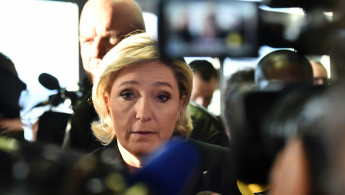France's Le Pen rides far-right wave of Trump's success
According to a poll conducted this week by French daily Le Monde, Marine Le Pen, head of France's right-wing, nationalist National Front party, leads the presidential race with between 25-26 percent of the vote, compared with 23-25 percent for her closest rival Francois Fillon, the candidate of the centre-right Republican Party.
Only a year ago Fillon was seen as the overwhelming favourite to succeed President Francois Hollande.
However, growing popular opposition in France to immigration in the face of Europe's ongoing refugee crisis, a string of deadly terror attacks in the country in the past year, and success enjoyed by right-wing leaders globally - evident in the success of Trump, Britain's Nigel Farage-led Brexiteers, and Dutch MP Geert Wilders - have all contributed to Le Pen's increased popularity.
For decades, the French National Front was viewed as a fringe right-wing group often subject to ridicule and lacking mainstream political support.
However, Le Pen's aspirations for the presidency appear increasingly realistic.
Although Trump and Le Pen appear potential allies, the French National Front leader has been cautious in expressing outright support for the president-elect, in part due to ambivalence towards him among right-wing supporters in Europe, whose nationalism is often partly defined by anti-Americanism.
Le Pen notably declined to say whether she had met with Trump during a recent visit to Trump Tower in New York.
However, she will also realise that Trump could serve as a potential ally in opposing globalism and France's current relationship with the European Union, key tenets of her election campaign.
One of her key advisers also notably lives in Trump Tower, and is a member of Trump's Mar-a-Lago beach club in Palm Beach, Florida, while Le Pen's father, Jean-Marie, took to Twitter following Trump's presidential election victory over Hillary Clinton to state: "Today the United States, tomorrow France."
Twitter Post
|
Le Pen has been more reserved in praise and referred to Trump's election as a "sign of hope" for "anti-establishment" politicians in Europe during a press conference earlier this month.
Elections are set to take place in France to elect a new president on 23 April. Le Pen is set to officially launch her election campaign on 4 February.





 Follow the Middle East's top stories in English at The New Arab on Google News
Follow the Middle East's top stories in English at The New Arab on Google News


